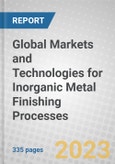This report analyzes the market by type of coatings, end-use industry, regional markets, and other aspects of inorganic metal finishing. Furthermore, we also provide new opportunities and challenges for emerging and developed countries in the global market.
Metal finishing includes many operations, including surface preparation, surface pretreatment and coating. The coating process may be organic, inorganic or hybrid. This report emphasizes inorganic metal coating technologies, relevant strategies and products, and their respective global and regional markets.
The report is prepared in a simple, easy-to-understand format; tables and figures are included to illustrate historical, current and future market scenarios. The report also covers leading companies with information on product types, business footprint, revenue, employee strength, etc. We have also included a list of other companies in the global and regional markets with their product-related information. The report also covers recent patents in the inorganic metal finishing market, which represents a significant investment area for investors.
The report discusses the impact of COVID-19 and the Russia-Ukraine war on the global and regional markets. Furthermore, the information also includes the impact of market dynamics for the short term and long term based on their relevancy and impact.
For market values, 2021 is considered the historic/base year, 2022 is an estimated year, and the market values are forecast through 2027. All market values are expressed in terms of millions of U.S. dollars.
Report Includes
- 67 data tables and 29 additional tables
- An up-to-date overview and industry analysis of the global markets for inorganic metal finishing processes and technologies
- Analyses of the global market trends, with historic market revenue (sales figures) for 2021, estimates for 2022, forecasts for 2023 and 2025, and projections of compound annual growth rates (CAGRs) through 2027
- Estimation of the actual market size and revenue forecast for the global inorganic metal finishing market, and corresponding market share analysis based on technology type, type of process, subprocess, end-use industry, and region
- Identification of various new products and the technologies involved in metal finishing, and analysis of various applications of inorganic metal finishing coatings and the markets for such applications in the near to mid-term
- Updated information on key market drivers and opportunities, industry shifts and regulations, and other region and industry specific macroeconomic variables that will influence this market demand in the coming years (2022-2027)
- Identification of the companies best positioned to meet this demand owing to or in conjunction with their proprietary technologies, product launches, and other strategic advantages
- Analysis of the upcoming market opportunities in the metal finishing industry with a holistic review of value chain analysis and Porter’s five forces model analysis and considering both micro and macro environmental factors prevailing in the market
- A relevant patent analysis with emphasis on emerging technologies and recently granted key patents in the global inorganic metal finishing industry
- Insight into the recent industry structure, competitive aspects of each product segments, increasing investment on research and development (R&D) activities, market growth strategies, and company revenue share analysis
- Descriptive company profiles of the leading global players, including A Brite Co. Inc., Atotech (MKS), OC Oerlikon Management AG, PLATIT AG, Rösler Surface Technology GmbH, Praxair S.T. Technology Inc. (Linde), Pioneer Metal Finishing
Table of Contents
Companies Mentioned
- A Brite Co. Inc.
- A.E. Aubin Co.
- Abakan Inc.
- Adf Systems
- Advanced Chemical Co. Inc.
- Angstrom Engineering Inc.
- Atotech (Mks)
- Guyson International Ltd.
- Hubbard-Hall Inc.
- International Plating Technology LLC
- Lincoln Industries
- Mass Finishing Inc.
- Mcalpin Industries
- Oc Oerlikon Management AG
- Pioneer Metal Finishing
- Purple Power Inc.
- Rosler Oberflachentechnik GmbH
- Secoa Metal Finishing LLC
- Sharretts Plating Co. Inc.
- Other Players
- Organizations and Societies for Metal Finishing
Table Information
| Report Attribute | Details |
|---|---|
| No. of Pages | 335 |
| Published | May 2023 |
| Forecast Period | 2022 - 2027 |
| Estimated Market Value ( USD | $ 93.3 Billion |
| Forecasted Market Value ( USD | $ 119.9 Billion |
| Compound Annual Growth Rate | 5.1% |
| Regions Covered | Global |
| No. of Companies Mentioned | 21 |









